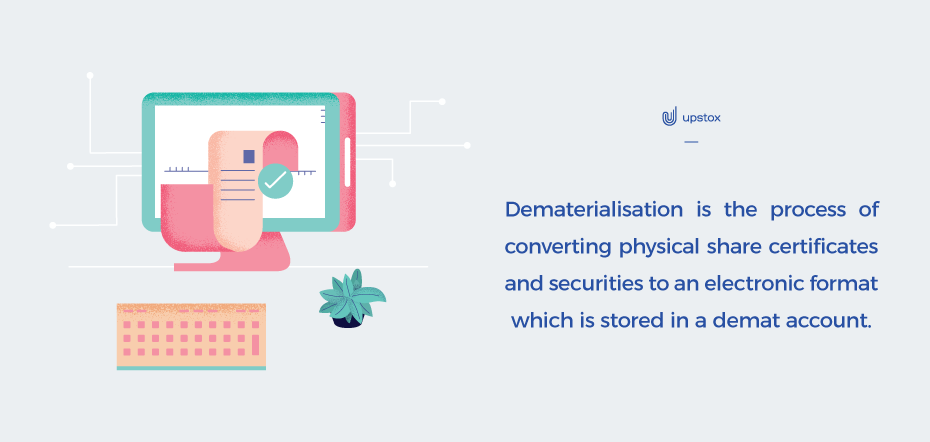What is Dematerialisation of Shares - Meaning, Process & Advantages
Written by Upstox Desk
Published on February 04, 2026 | 5 min read

We’ve talked about demat accounts in previous posts, and about the pre-demat era when securities were held in ‘paper certificates’ instead of the electronic form they are stored in today. It was truly a very different time - one that came with multiple difficulties - such as delays, storage issues and many more.

To alleviate the risk associated with trading of securities in paper format, the concept of dematerialization was introduced in the Indian share market. Securities would now be traded and stored in a ‘dematerialised’, or electronic format. Through the dematerialization or “demat” process, you can convert your physical paper certificates into a safer and easily accessible electronic form. The Depository is the body which is responsible for storing and maintaining your shares electronically.
Key Points
- Dematerialisation is the process of converting your physical share certificates into electronic records.
- You just need to fill out a Demat Request Form (DRF) and deposit it along with your physical shares as proof.
- You can process a dematerialization request with the broker of your choice.
The Process of Dematerialisation of Shares
The meaning or process of dematerialization is a rather simple one. There are 5 steps for dematerializing your shares:
- First, approach your brokerage firm and complete all the procedures to open a demat account.
- To convert your securities from physical to electronic form, you have to request a Demat Request Form (DRF). You have to fill out the DRF and deposit it along with the physical shares.
- For every share with a different ISIN (International Securities Identification Number), a separate form will be required.
- The brokerage firm will then process the request to the company in which you hold the shares.
- Once the request is approved by the company, your physical form of the share will be destroyed and a confirmation will be sent to the depository.
- The depository will confirm the dematerialization process. Once the process is completed, all your physical shares will be converted into electronic form.
- This process can take anywhere from 15 to 30 days after the dematerialization request has been submitted.
Did You Know? An ISIN (International Securities Identification Numbering) is a standardized global number format, assigned to uniquely identify any tradable financial asset like stocks, bonds, futures, and options.
The Benefits of Dematerialisation
Consider all the hassles you have to go through with physical securities. In this digital day and age of going cashless, our reliance on papers has reduced. Different aspects of your life are going paperless: traveling in a cab, paying for utility, paying your phone bills are just a few examples. Then, why not go paperless when it comes to your investments in the share markets?
Now consider a world without the risk associated with holding on to physical share certificates:
- Convenience: You will save a significant amount of time, money and energy if you use an online account instead of dealing in paper securities. You need not go to the notary or broker every single time to collect purchased deliveries or to submit share certificates that you want to sell.
- Secured benefits: Corporate benefits like bonuses, dividends, and stock-split are all credited automatically into your account. This eliminates any transit loss.
- Faster: As your transactions are not executed via paper, you have access to significantly quicker transactions online, which is essentially an increase in your trading efficiency. Think of all the other things that you could do with all that time!
- Less Restrictive: You are able to buy and sell any number of shares which is not possible through physical securities.
- Location Agnostic: A online account brings the power of the internet to your trading. You will be able to trade online from any location.
- Cheaper: You are free from all stamp duty payments for the transfer of securities. This brings down your transaction costs significantly. Hence the brokerage charges are very low in comparison to physical securities. Even more so with discount brokers.
What if you don’t dematerialize though? What do you lose out then?
A Local Glimpse:
- The Depository Act was enacted in 1996.
- First depository in India: National Securities Depository Ltd (NSDL).
- February 8, 1999: Central Depository Services Limited started its operations in Mumbai (CDSL).
A Global picture: 1973: First depository in the world: Depository Trust Company (DTC) in the US.
Importance of Dematerialisation
Dematerialisation is an important process - a must for ease of trading in the stock market. If however, you decide to skip it:
- You’ll constantly have to worry about a possible human error while handling physical share certificates. On the other hand, the Dematerialized account can ensure safe, time-saving and hassle-free operations.
- You will not have to keep a track of all your past and current transactions in the securities market. All your transactions are automatically updated in your account.
- Information about all your transactions is safe with your online brokerage firm, and available in just a few clicks in your personalized account.
The benefits of dematerialization are obvious. Unless perhaps there’s sentimental value involved, there really is no reason for you to be retaining your securities in paper certificates. Most experts recommend that you open a demat account, and dematerialize all your securities with a Demat Request Form (DRF). This will save you time, money, and make it easy for you to trade large-scale orders of securities. With a discount broker like Upstox, your costs will reduce even further. If however you choose to keep your certificates in paper form, expect difficulties in handling and storing them, and keeping tracking of your transactions.
About Author
Upstox Desk
Upstox Desk
Team of expert writers dedicated to providing insightful and comprehensive coverage on stock markets, economic trends, commodities, business developments, and personal finance. With a passion for delivering valuable information, the team strives to keep readers informed about the latest trends and developments in the financial world.
Read more from UpstoxUpstox is a leading Indian financial services company that offers online trading and investment services in stocks, commodities, currencies, mutual funds, and more. Founded in 2009 and headquartered in Mumbai, Upstox is backed by prominent investors including Ratan Tata, Tiger Global, and Kalaari Capital. It operates under RKSV Securities and is registered with SEBI, NSE, BSE, and other regulatory bodies, ensuring secure and compliant trading experiences.
























